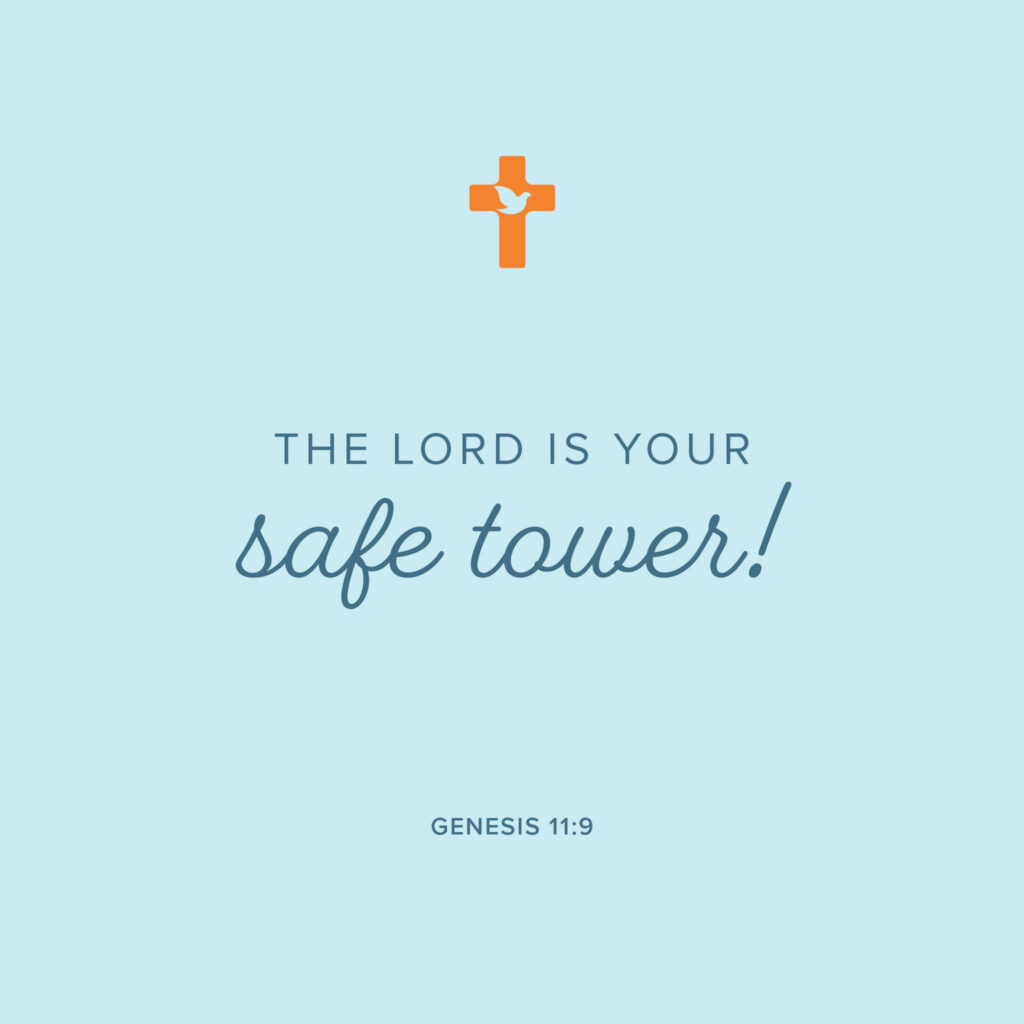June 8, 2025
Pastor Gunnar Ledermann
Genesis 11:1–9
Genesis 11:1–9
1 Now the whole world had one language and a common speech. 2 As people moved eastward, they found a plain in Shinar and settled there.
3 They said to each other, “Come, let’s make bricks and bake them thoroughly.” They used brick instead of stone, and tar for mortar. 4 Then they said, “Come, let us build ourselves a city, with a tower that reaches to the heavens, so that we may make a name for ourselves; otherwise we will be scattered over the face of the whole earth.”
5 But the LORD came down to see the city and the tower the people were building. 6 The LORD said, “If as one people speaking the same language they have begun to do this, then nothing they plan to do will be impossible for them. 7 Come, let us go down and confuse their language so they will not understand each other.”
8 So the LORD scattered them from there over all the earth, and they stopped building the city. 9 That is why it was called Babel—because there the LORD confused the language of the whole world. From there the LORD scattered them over the face of the whole earth.
Summertime means all kinds of outdoor activities like pool parties, bubbles, water balloon fights, bike riding, roller skating, sidewalk chalk, etc. All those outdoor activities are part of summer until you see the kitchen table and a toy box full of blocks. Then you stay inside to create your tower. The tower might be a fortress to protect against Dragons, ninjas or super villains, or it could be a place for a princess, unicorns or fairies to gather. The problem with that tower though is that it is on the kitchen table where meals are eaten; it is not for building towers.
Dinnertime means all kinds of things from grandma’s recipes to the microwave to a to-go-bag to a sit-down restaurant. There are many possibilities for dinner unless someone has already made a plan and shared it with you. In that case, there is only one plan for dinner. Until someone needs to pick something up from the grocery store, then other possibilities may arise in their mind. Or until it is too late to pick up the grocery store items, and someone picks something up from a fast-food restaurant. Or until someone ran out of time to make the planned dinner and ordered from an app, when another shared and agreed upon plan was not to use apps to save money, to focus on meal prep and to eat healthier. There is a difference in these scenarios between a miscommunication and a turn from clear directions.
After the Flood recorded in the book of Genesis, God gave clear directions. In Genesis 9, God told Noah and his sons,
1 … “Be fruitful and increase in number and fill the earth.”
We would expect then for the sons to listen and each go their separate way. Especially when they all knew the love of God who carried them safely in the ark sparing them from his judgment against those who rejected God. Instead, we read that their descendants settled in one place and built a tower to make a name for themselves. This was not miscommunication, but defiance as we read in Gensis, 11,
1 Now the whole world had one language and a common speech. 2 As people moved eastward, they found a plain in Shinar and settled there. 3 They said to each other, “Come, let’s make bricks and bake them thoroughly.” They used brick instead of stone, and tar for mortar. 4 Then they said, “Come, let us build ourselves a city, with a tower that reaches to the heavens, so that we may make a name for ourselves; otherwise we will be scattered over the face of the whole earth.”
The clear direction from God to spread out, increase and fill the earth with people who trust, obey and give glory to God was rejected. Instead, they found one place and decided to build a tower with backed bricks of their own ingenuity trusting in their own efforts to remain safe. They believed the tower would stand to protect them, but God wanted them to spread out trusting his plan and his power to keep them safe.
Acts of defiance do not go unnoticed by God. Noah and his son’s had received a command from the LORD and their descendants rejected it, and we hear God’s response in Genesis 11,
5 But the LORD came down to see the city and the tower the people were building. 6 The LORD said, “If as one people speaking the same language they have begun to do this, then nothing they plan to do will be impossible for them. 7 Come, let us go down and confuse their language so they will not understand each other.”
With vivid language, Moses who recorded these events in Genesis pictures the LORD coming down to confirm the defiance and carry out judgment. The LORD had promised not to send another flood to destroy the world, so he flooded the world with many languages instead. The LORD humbled the people by confusing their languages and forcing them to spread out over the whole earth.
As descendants of Noah and his sons, we live in a defiant world. The confusion of language as punishment for the sinful defiance after the Flood highlights how opposed to communicating with one another we are. We may talk about the beauty of other languages or attribute their variety to human intellect and creativity, but few of us take the time to learn how to communicate using another language. Instead, we make towers out of our languages and work to raise them higher than all others to make a name for ourselves. Our insecurities and distrust come from our own sinful hearts and the fear of harm from the sinful world around us. Like the descendants of Noah, we know of the LORD and his words, but often disregard them. The moment we defy God, we are not swept away by a flood or left unable to give our order to the waiter or waitress, so we do not love, honor, fear or respect him. Rather than live in the safety the LORD gives us in his forgiveness and love, we search for safety in building up our own towers. We work at making a name for ourselves rather than live as the LORD’s people, but in the end, the words of Psalm 24 remain true,
1 The earth is the LORD’s, and everything in it, the world, and all who live in it.
We are under the LORD’s rule as his creatures and he wants to bless us in this world, until we turn away from him. Even one act of defiance makes us guilty as we hear in James 2,
10 For whoever keeps the whole law and yet stumbles at just one point is guilty of breaking all of it.
Turning from the safety of the LORD and his saving name, leaves us facing the judgment of the one true God who can destroy the world.
Rather than destruction, the LORD established a safe place for us in him. The LORD did not immediately bring destruction on the descendants of Noah but miraculously humbled them. This world still has many languages, but there remains only one God who loves all people. In these verses from Genesis, the name God uses for himself is represented in English by capitalizing all the letters of the word ‘lord.’ The ‘LORD’ is also translated as Yahweh or Jehovah from same four Hebrew letters. This name for God communicates his grace and faithfulness to his promises. Again, the LORD promised not to destroy the world with another flood, and he did not. More than that, God’s promise of the Savior remained for Noah and all his descendants, us included. We are as sinful, weak and defiant as those generations just after the Flood, but God has given us the Holy Spirit so that we are not destroyed. In our Gospel reading from John 14, Jesus shared the work of the Holy Spirit that would be highlighted at Pentecost,
25 “All this I have spoken while still with you. 26 But the Advocate, the Holy Spirit, whom the Father will send in my name, will teach you all things and will remind you of everything I have said to you. 27 Peace I leave with you; my peace I give you. I do not give to you as the world gives. Do not let your hearts be troubled and do not be afraid.”
At the first Pentecost, the Holy Spirit in a miraculous way undid for a moment the confusion of languages so that all who were gathered that day in Jerusalem could hear the clear message of Jesus’ death and resurrection for the forgiveness of sins and gift of eternal life in heaven. The Holy Spirit continues his work in us giving us heavenly peace in our Savior Jesus. The Holy Spirit lives in our hearts strengthening our faith. The fortress of faith in our hearts is built on the name of the LORD, which is defined beautifully in Exodus 34,
6 … “The LORD, the LORD, the compassionate and gracious God, slow to anger, abounding in love and faithfulness, 7 maintaining love to thousands, and forgiving wickedness, rebellion and sin.”
We do not need to make a name for ourselves in this world. The LORD’s name already stands as a safe place for us. We are the people of the LORD who bear his name now and will praise his name in peace forever in heaven.
The first Pentecost miraculously harmonized the gospel to bring peace to all who heard it. God does not want our reaction to the many languages of the world to be pride and division. Rather, he wants us to humble ourselves to learn how to communicate the gospel to others. Language is not the only barrier we face when sharing Jesus with others, and we are tested by the diverse directions our individual sinful natures take us. When we are tempted to play it safe when it comes to sharing Jesus with others, hearing the power of the Holy Spirit at the first Pentecost strengthens our love for sharing Jesus with others as we read in Acts 2,
4 All of them were filled with the Holy Spirit and began to speak in other tongues as the Spirit enabled them.
The Holy Spirit is the power behind our efforts to share Jesus with others. When we lack love, he fills us up. And when we lack the words, he promises to provide those as well. The simple clear truth we hold to and share with others was quoted by Peter on the first Pentecost from the Old Testament prophet Joel,
21 ‘And everyone who calls on the name of the LORD will be saved.’
Our safe place is with the LORD. We trust in his name, his gracious, promise filled, saving name to give us forgiveness, love and belonging. The LORD is our safe fortress, and he wants us to share the good news that his tower has many rooms for those scattered around this world.
Summertime means all kinds of outdoor activities, not building block towers on the kitchen table. After the Flood in the book of Genesis God told Noah and his sons in Genesis 9,
1 … “Be fruitful and increase in number and fill the earth.”
Instead, they settled in one place and built a tower to make a name for themselves. Then, God stopped them in their disobedience by confusing their languages. We still live in a world of many languages, but God made clear at Pentecost that he wants Jesus shared with all languages. Filled with the Holy Spirit we share the good news of Jesus with all people that the LORD is our safe tower of forgiveness and eternal life. Amen.




